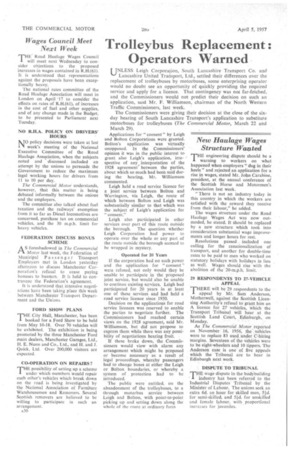New Haulage Wages Structure Wasted
Page 32

If you've noticed an error in this article please click here to report it so we can fix it.
THE engineering dispute should be a warning to workers on what happened when employers " dug in their heels" and rejected an application for a rise in wages, stated Mr. John Carabine, president, at the annual conference of the Scottish Horse and Motormen's Association last week.
"There is not an industry today in this country in which the workers are satisfied with the reward they receive from their labour," he added.
The wages structure under the Road Haulage Wages Act was now outmoded, he stated. It should be replaced by a new structure which took into consideration substantial wage improvements and longer hours for rest.
Resolutions passed included one calling for the renationalization of transport, and another for double-time rates to be paid to men who worked on statutory holidays with holidays in lieu as well. Wages should rise with the abolition of the 20-m.p.h. limit.
29 RESPONDENTS TO 27-VEHICLE APPEAL THERE will be 29 respondents to the appeal by Mr. Sam Anderson, Motherwell, against the Scottish Licensing Authority's refusal to grant him an A licence for 27 vehicles, which the Transport Tribunal will hear at the Scottish Land Court, Edinburgh, on Monday.
As The Commercial Motor reported on November. 16, 1956, the vehicles were to replace 83 used under C-hiring margins. Seventeen of the vehicles were to be eight-wheelers and 10 tippers. The Anderson case is one of five appeals which the Tribunal are to hear in Edinburgh next week.
DISPUTE TO TRIBUNAL
THE wage dispute in the bodybuilding industry has been referred to the Industrial Disputes Tribunal by the Minister of Labour. The unions seek an extra 6d. an hour for skilled men, 5-id. for semi-skilled, and 50. for unskilled and female labour, with proportional increases for juveniles.
















































































































